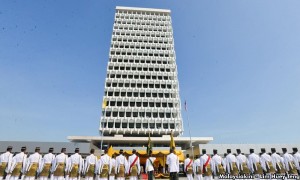– R NADESWARAN, September 10, 2017.
 Sept 11, 1963 was an important day in the history of Malaya, which just six years earlier, had won its independence from Great Britain. The Westminster system it adopted saw a thriving democracy.
Sept 11, 1963 was an important day in the history of Malaya, which just six years earlier, had won its independence from Great Britain. The Westminster system it adopted saw a thriving democracy.
Members were witty and could think on their feet and parliamentary sessions were lively. After the debates, members from both sides of the divide and ministers, their aides and reporters would adjourn to the Parliament bar where they would banter over beers and stenghas without any inhibitions. There were even cigarettes specially packed for parliamentarians!
It was in one of these parliamentary sessions 19 days earlier that subsequently brought down one of the then Prime Minister Tunku Abdul Rahman’s trusted lieutenants.
DR Seenivasagam, an MP from the People’s Progressive Party, asked for leave to move an adjournment “to discuss a matter of corrupt practice indulged in by the minister of education in that he received various sums of money and other favours from a company known as the Malay Natural Fertilisers Co Ltd…”
The minister, Abdul Rahman Talib challenged Seenivasagam to repeat the allegations outside Parliament which prompted a gathering at the Chinese Assembly Hall, where the opposition MP read out a prepared statement, which among others, said (as per the judgment):
“I challenge Inche Rahman Talib to submit to an inquiry by a commission of inquiry or by any tribunal constituted under parliamentary practice and procedure and I honestly believe that such an inquiry will show:
“(a) that the minister, Inche Rahman Talib is guilty of misconduct to the extent that such misconduct renders him, in my opinion, unfit to be a minister of the government,
“(b) that he has been guilty of nepotism,
“(c) that by reason of such misconduct he is unfit to hold public office as he has, in my opinion, shaken public confidence in the fair and impartial administration of public affairs.”
(The full judgment of Abdul Rahman v Seenivasagn & Another can be found in the Malayan Law Journal – [1965] 31 MLJ).
The lengthy trial which followed was given prominent coverage by the newspapers, and almost daily, the public was provided information of how Abdul Rahman, through his wife, had benefitted from the issuance of a licence to extract guano from a cave in Jerantut.
Judge TR Hepworth in dismissing Abdul Rahman’s suit, said: “The defendants have succeeded in justifying by proving the truth of substantially the whole of the words of the statement… with the exception of a paragraph relating to the payment of cash to the plaintiff.”
The Tunku declared he believed in Abdul Rahman’s innocence but accepted his resignation and then posted him to Egypt as ambassador.
A walk down memory lane
The same Chinese Assembly Hall was the venue for a similar challenge which was made and accepted. In the Parliament in the early 80s, the late Karpal Singh had accused then works minister S Samy Vellu of abusing his ministerial powers. Karpal was challenged to repeat the statement outside the House, which he promptly did.
Although an action was filed in court on the basis of defamation, the matter was not pursued and the action struck out for non-prosecution, according to media lawyer Bhag Singh.
Why this walk down memory lane, the reader may ask.
One, it is to remind the readers, especially the younger ones, of the kind of people who were elected to Parliament and the kind of ministers who dared to take on any accusation made against them. These days, sadly, such qualities are wretchedly lacking in many of our elected representatives and in the system as a whole.
It has to be admitted that the quality of the debates has deteriorated, the language and conduct of a handful can only be described as uncouth and answers provided during Question Time is waning to the point of ridiculousness, citing subjudice and other irrelevant issues.
So many statements – allegations, claims and even the truth – have been made in and outside Parliament. No one has had the gall and gumption to take the matter further. Understandably, the fear of taking the stand and being grilled under cross-examination is a risk many don’t want to take.
Unlike other litigations, in defamation cases, the claimant has to prove he was defamed. If one has a chequered background or a sullied past and if he is queried on his earlier activities, there is a likelihood of opening a can of worms.
Anything said in open court can and will be reported as publications enjoy privilege when publishing proceedings.
More importantly, in view of the chest-thumping by the Malaysian Anti-Corruption Commission (MACC) that the agency would sue Penang Chief Minister Lim Guan Eng for defamation, there’s a pertinent question to ask: Who will follow the precedent set by Abdul Rahman if the MACC loses its case?
We wait with bated breath for the answer.
R NADESWARAN has fond memories of being at the Chinese Assembly Hall when Karpal Singh repeated those charges against Samy Vellu. Comments: [email protected].
The views expressed here are those of the author/contributor and do not necessarily represent the views of Malaysiakini.
























